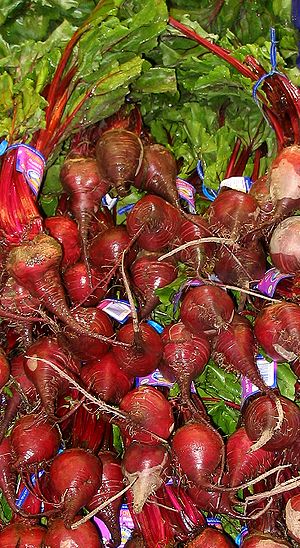 Image via Wikipedia
Image via WikipediaLets look at the funny looking red bulb:
Beetroots are a rich source of potent antioxidants and nutrients, including magnesium, sodium, potassium and vitamin C, and betaine, which is important for cardiovascular health. It functions by acting with other nutrients to reduce the concentration of homocysteine, a homologue of the naturally occurring amino acid cysteine, which can be harmful to blood vessels and thus contribute to the development of heart disease, stroke, and peripheral vascular disease. Betaine functions in conjunction with S-adenosylmethionine, folic acid, and vitamins B6 and B12 to carry out this function.
Additionally, several preliminary studies on both rats and humans have shown betaine may protect against liver disease, particularly the build up of fatty deposits in the liver caused by alcohol abuse, protein deficiency, or diabetes, among other causes. The nutrient also helps individuals with hypochlorhydria, a condition causing abnormally low levels of stomach acid, by increasing stomach acidity.
Beetroot juice has been shown to lower blood pressure and thus help prevent cardiovascular problems. Research published in the American Heart Association journal Hypertension showed drinking 500 ml of beetroot juice led to a reduction in blood pressure within one hour. The reduction was more pronounced after three to four hours, and was measurable up to 24 hours after drinking the juice. The effect is attributed to the high nitrate content of the beetroot. The study correlated high nitrate concentrations in the blood following ingestion of the beetroot juice and the drop in blood pressure. Dietary nitrate, such as that found in the beetroot, is thought to be a source for the biological messenger nitric oxide, which is used by the endothelium to signal smooth muscle, triggering it to relax. This induces vasodilation and increased blood flow.
Other studies have found the positive effects beetroot juice can have on human exercise and performances. In studies conducted by the Exeter University, scientists found cyclists who drank a half-litre of beetroot juice several hours before setting off were able to ride up to 20 per cent longer than those who drank a placebo blackcurrant juice.
Studies have also shown that beet fiber is effective in lower LDL and total serum cholesterol levels. Triglycerides were also reduced. In this case the researchers postulated that folate, or naturally occurring Vitamin B, was the key.
Beet juice research is in its infancy, says Wake Forest researcher Gary Miller, PhD. “We are starting to unravel the intriguing health benefits of beet juice primarily because of dietary nitrates and its impact on blood flow and blood pressure," Miller says.
Through a chain reaction, the body converts the nitrates in beet juice into nitric oxide, a compound that enhances blood flow throughout the body and helps lower blood pressure.
Related articles


No comments:
Post a Comment